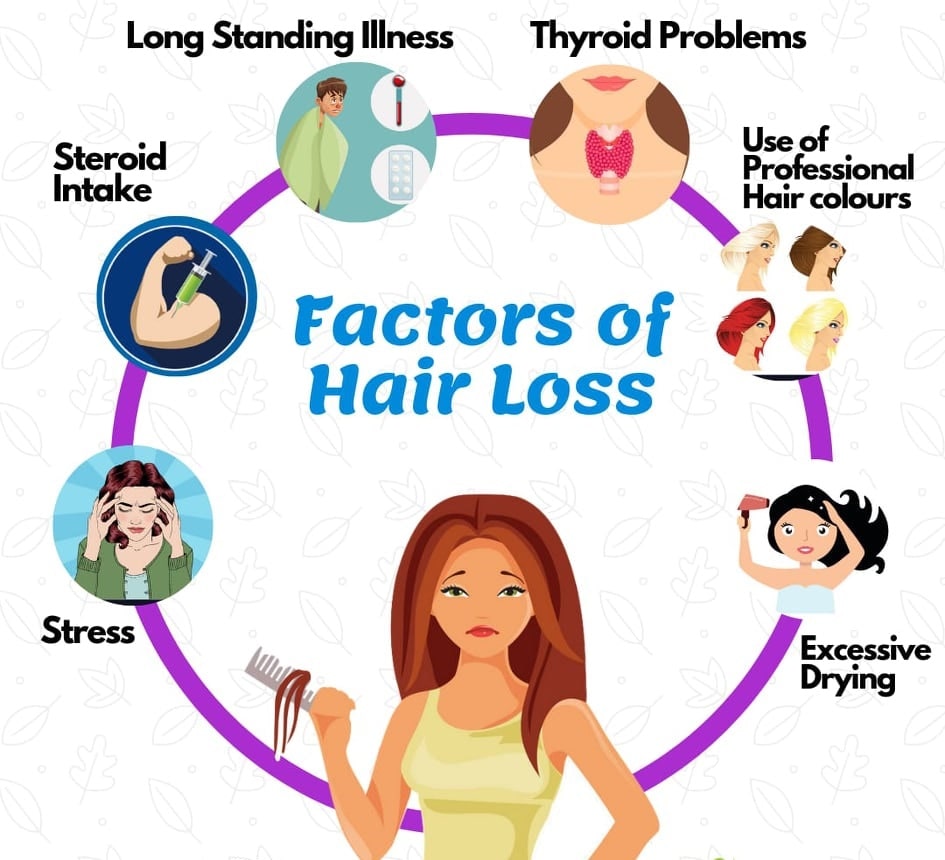Hair loss is one of the most troublesome problems among women and men. Hair loss may be the cause of improper care, and the most common causes are micronutrient and vitamin deficiencies and hormonal disorders. Many people may also have a genetic predisposition to hair loss. It is necessary to find the cause of excessive baldness.
How to recognize excessive hair loss?
Hair loss that is excessive is a concern for males and females. Alopecia does not only affect the elderly people of all ages who complain about this type of problem. Healthy people lose about 50-100 hairs each day. Rapid hair loss may be the result of factors such as improper care, the presence of hormonal disorders, severe and prolonged stress, skin diseases, or the treatment of certain diseases (not only chemotherapy).
Physiologically, we can define slight alopecia. Not all of us will keep our hair healthy and lush until old age. If the hair actually comes out in handfuls, we find it on the pillow, or we see thinning hair, then it is necessary to visit a specialist for diagnostics and introduce appropriate treatment.
Why is our hair falling out?
Hair loss or loss is one of the most physiological phenomena. It results from the natural cycle of hair growth in the following stages: growth, involution, rest, and finally, the release of the hair. Our scalp has approximately 150,000 hair follicles that are currently in different stages of the cycle. As a result, the growth and loss of hair is continuous phenomenon. In healthy people, about 80-85% of hair is in the growth phase.
What has a greater impact on hair loss - diet or stress?
A deficiency of iron, B vitamins, and protein (in people who are slimming) leads to increased hair loss. The bad condition of our hair tells us that our body is not nourished properly.
One of the first symptoms of anemia caused by inadequate iron levels is excessive hair loss. To keep the hair in the best condition, we should also take care of a balanced diet. The priority of our diet should be animal protein and vitamins and minerals: iron, biotin, selenium, zinc, and whole grains.
Another factor that can have an adverse effect on hair loss is stress. For many people, stress is associated mainly with graying hair. Any major or minor psychological trauma – stressful work, serious illness, or accident may lead to hair loss.
Hair lost due to stress regenerates just as quickly, and new hair grows in its place quite quickly, and thus you will not experience sudden hair loss.
Is alopecia related to disease?
Hair loss is a common result of the underlying disease. One should distinguish here hypothyroidism. One of the symptoms of this disease is brittleness, dryness, and hair loss. In this case, hair loss can be stopped by supplementing with thyroid hormones, which quickly restores the hormonal balance.
During hyperthyroidism, excess sebum is secreted on the scalp, which is therefore associated with more oily hair. The hair is then delicate and very thin. The goals of treatment are to balance the hormonal balance.
Factors that cause hair loss:

Serious diseases and major surgeries
– Vitamin A poisoning,
– Diseases related to excessive seborrhea,
– PCOS – polycystic ovary syndrome,
– Pregnancy,
– Alopecia areata,
– Autoimmune diseases,
– Genetic factors,
– Anemia,
– Thyroid diseases
Natural remedies for hair
Loss: – Fenugreek – rub the infusion of its seeds into the scalp to prevent further hair loss. It should be used once a week, and preferably on days off because its smell is very intense,
– Horsetail and nettle infusion – you can drink it daily for a month, but it has a strong diuretic effect, and then take a break for 3 months,
– Linseed – gruel (pour a tablespoon of linseed with water and set aside for the whole night, drink in the morning) or a hair mask (boil for a quarter of an hour, strain), apply the resulting gel to the scalp.
What tests to perform?
The most important studies that will help us determine the cause of our baldness include:
– Ferritin level – such a study will give us more detailed information about the iron economy; it is worth knowing that the result of the iron level alone gives us little for accurate diagnosis,
– Morphology with a smear – mainly allows us to detect anemia, inflammation, and immunodeficiency,
– Vitamin B12 level determination,
– ESR – a marker of autoimmune diseases, inflammations, and cancerous,
– TSH level – will allow us to diagnose hypothyroidism and hyperthyroidism; if there are any abnormalities, it will be necessary to perform an ultrasound of the thyroid gland, determination of free thyroid hormones and the level of anti-thyroid antibodies,
– Total protein level – will help us indicate kidney or liver diseases or deep malnutrition,
– The level of sex hormones; prolactin, progesterone, DHEA sulfate, androstenedione, and testosterone,
– The level of cortisol – the stress hormone.
Such tests are needed to rule out many potential diseases in time, including baldness. Sometimes it will also be necessary to carry out further diagnostics and detailed tests, which a dermatologist will order. A majority of the conditions which cause loss of hair can be addressed.




